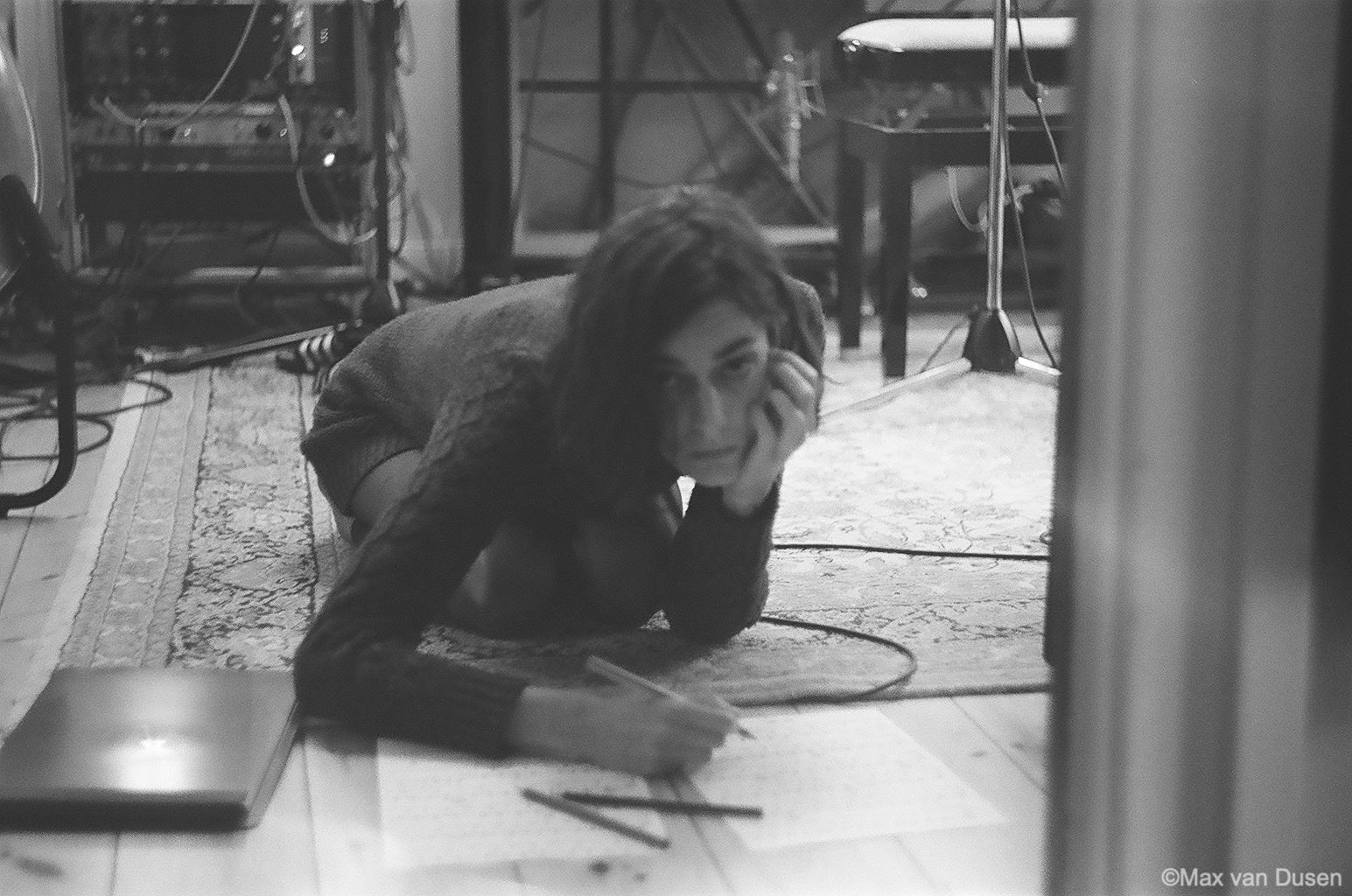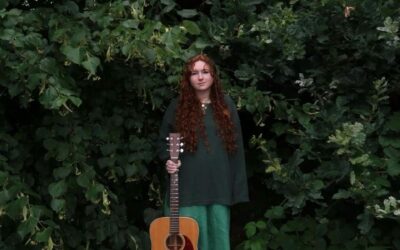Berlin’s vibrant arts scene, featuring prestigious film festivals like the Berlinale and a rich musical landscape with over 260 venues, attracts female film composers seeking creative inspiration. As a leading filmmaking hub in Europe, Berlin offers numerous opportunities for collaboration and growth, including the annual Film Scoring competition.

5678 Magazine spoke to two female film composers to get their thoughts on why Berlin is the capital to be at right now.
Lena Radivoj, embodies vibrancy, passion, and daring. At thirty-one, she’s a Berlin-based film composer with a unique upbringing in Croatia, raised by a Croatian father and Austrian mother. Lena’s musical journey began early with piano lessons, leading her to study Music Theory in Austria in 2011. While she never envisioned a career in film composition, Lena’s life took an unexpected turn in 2020 when she followed her heart to Berlin for love. Despite initial hesitations, she trusted her instincts and embraced the city’s vibrant energy. In the last four years, Lena has lent her talents to numerous feature film projects, including the acclaimed ‘Good News.’
In a conversation with Lena, one of Berlin’s thriving female film composers, we explore why the city has become a hub for talent in this field.
5678: Hi Lena, you mentioned moving to Berlin was “pure luck.” How has living in this city inspired your creativity as a female film composer?
Lena: As a female film composer, being in Berlin is inspiring. It’s a city where creativity and authenticity are celebrated, and that resonates with me. Seeing artists turn trash into art reminds me that beauty can come from anywhere. It’s empowering to be in a place where innovation is encouraged and surrounded by people who value expression in all its forms.
5678: You could live in London, Los Angeles, or even New York as a film composer. What makes Berlin so special compared to other major cities?
Lena: Berlin is like a canvas splashed with vibrant colours, but it’s also got a gritty charm that sets it apart. Unlike other big cities, Berlin still holds on to the spirit of the underground scene from the eighties, which you can feel in every splash of graffiti and pulse of the punk scene. It’s rough around the edges, but that’s part of its charm – there’s an edginess to Berlin that makes it feel alive and authentic. It’s not pretty but it sure got character.
5678: Do you think female film composers are embraced in Berlin, especially considering how the scene tends to be more free-flowing compared to places like London and LA where it can feel like a big ‘boys club.’
Lena: I feel welcomed in Berlin as a female composer. There are institutions, mentorship programmes and festivals dedicated to female musicians. I also had the opportunity to be part of the [Film University of Babelsberg] entrance exam commission as a student. This year, we noticed a lot more women applying for film composing at our university, and we were rooting for them. It was amazing to see that, at one point, ninety per cent of the composers in our year group were women – something unheard of at our university.
~A recent report by the European Audiovisual Observatory reveals a stark reality: only 10% of music composers involved in European feature films from 2018 to 2022 were women. What’s even more concerning is that, on average, female composers worked on fewer films compared to their male counterparts. When looking at the overall picture and considering the presence of both genders in composing roles per feature film, the average share of female composers per film was just 9%.
5678: You’re probably aware of the numbers. Yes, there’s still a lot of ground to cover. Do these small victories hint that female film composers are making a lasting mark in Berlin?
Lena: Yeah, I think things are starting to change. What I’ve seen is that in some big productions, both men and women are delivering top-notch work with powerful musical styles. Here in Germany, we’ve got talents like Dasha Downhour making a name for herself. It’s exciting to see more women stepping into film composing; we’re bringing some seriously unique musical vibes to the table.
~Another statistic that stands out, for 84% of films, the music score was the work of one individual composer. Women in the sample were less likely than men to be the sole composer for a film. Female composers worked on 10% of European feature films, whether alone or in teams [European Audiovisual Observatory].
5678: I’d love to hear about your recent project, ‘Good News,’ the feature film that earned the prestigious Max Ophüls Prize. It’s fascinating that you were the only female composer involved, breaking industry norms. Could you share what the film is about and your experience working on it?
Lena: So, the premise of the film is that Leo, a German journalist, travels to southern Thailand to report on a rebel group. There, he befriends Mawar, who dreams of a future in Germany. As Leo assists her, memories of his life in Berlin resurface, leading him into a moral dilemma as he rushes to complete his article without contact with the rebels.
I love it when a film is structured so well that every scene feels powerful, even without a musical backdrop. I’ve been fortunate that my last two projects were structured so effectively. It really pushed me out of my comfort zone in a good way.

5678: You said yourself that your career was driven by taking risks. What advice would you give to young women who are considering pursuing a music career in Berlin?
Lena: Young women sometimes have this tendency to play it safe. I want them to be brave, and be consistent with taking action instead of waiting and wondering what could happen.
Also, the music landscape has changed a lot. It’s not like in the past when female artists in electronic music or sound engineering were seen as odd for being in a male-dominated field.
The bottom line is that it can be done, I’m very lucky because I’m f*cking happy with my job.
Don’t ask for permission. Trust your instinct and go for it.
Chamin ( her stage name) is a talented film composer originally from Seoul, based now in Berlin. With a background in pop music from London since 2015 and vocal coaching experience, she found her true calling in film composition. Over the past three years in Berlin, where she studied at the Film University of Babelsberg, Chamin has been actively involved in scoring for short films. I sat down with her to discuss why Berlin has become a vibrant hub for female composers in the film industry.
5678: Hi Chamin, something you and Lena have in common actually is that you both decided to take risks when moving to Berlin and ended up thriving here. How does Berlin compare to the creative scene in South Korea?
Chamin: I think South Korea is bursting with creativity, especially with the huge influence of K-pop and Korean dramas boosting our film industry in the last decade. But what I really love about Berlin is the incredible diversity it offers artists like me. You can go from attending a Turkish music concert to a French opera, and then catch an Irish play—all in one city. Korea doesn’t quite have to the same extent due to its more homogenous society.
5678: Berlin has a massive creative network of artists. How are you networking as a film composer in the city?
Chamin: Yes, there are a lot networking opportunities that you can attend such as, Berlin Female Film Composers Network (BFFCN) which aims to connect and support female composers working in the film industry in Berlin.
Also there is Berlin Film Music Week: an annual event that brings together composers, filmmakers, music supervisors, and other industry professionals to celebrate film music and collaboration. During the event female composers can attend panels, workshops, and networking events to connect with mentors and peers and gain insights into the industry.

5678: I have spoken to film critics and film students based in London. I was told that the funding in the UK is not as robust compared to Germany. What funding is available in Berlin as an aspiring female film composer?
Chamin: In Berlin, film composers have plenty of ways to get support for their projects. They can tap into grants from places like the Berlin Senate Department for Culture and Europe or the German Federal Film Fund (DFFF). Plus, there are opportunities with foundations, film festivals, and even private backers who love supporting creative projects. I think as someone starting out in film composing, Germany offers more support than the UK.
5678: Lastly, what are your future goals long term/ is there anything you would like to do and would you recommend Berlin to aspiring film composers?
Chamin: I am always fascinated by the combination of story and music. So, if there is a meaningful project, I am open to it, no matter what form it takes. And personally, I would recommend Berlin. So far, It’s been an amazing experience for me and I’m happy to be here.




